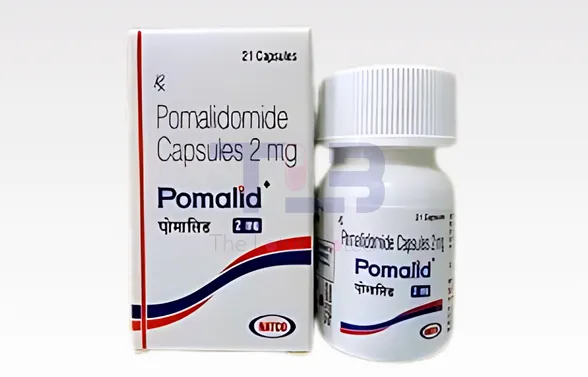Description
Complete Handbook on Lenalid 5 Capsule: Usage and Insight
| Medicine | Lenvat 4mg Capsule |
| Marketed By | Natco Pharma Ltd. |
| Active Ingredient | Lenvatinib 4mg |
| Storage | Store below 30 °C |
| Consume Type | Oral |
Lenvat Lenvatinib Capsules 4 mg – Introduction
Lenvat Capsules 4 mg are medicines used to treat cancer (anti-neoplastic medicines), which work by slowing or stopping cancer growth. It is mainly prescribed for the treatment of thyroid cancer and liver cancer (hepatocellular carcinoma) that cannot be removed with surgery.
How Lenvat 4mg Capsule Work: A Closer Look
Lenvat Lenvatinib Capsules 4 mg work by blocking receptor tyrosine kinases, leading to reduced oxygen and nutrient supply to cancer cells, ultimately destroying them and treating cancer.
Use
- Thyroid Cancer
- Hepatocellular carcinoma
- Endometrial cancer
- Renal cell carcinoma
Lenvat lenvatinib 10 mg capsules – The Benefits
This medication is used for the following conditions in adults:
Thyroid cancer
Lenvat Lenvatinib Capsules 4 mg slows tumor growth and may extend survival, providing a chance for improved quality of life.
Hepatocellular carcinoma
People with hepatocellular carcinoma can get relief with Lenvat 4mg Capsule, as it helps shrink tumors and may delay disease progression, offering renewed hope for a better outcome.
Endometrial Cancer
Women with endometrial cancer benefit from Lenvat 4mg Capsule, which targets cancer cells and may slow disease advancement, providing a chance for prolonged survival.
Renal Cell Carcinoma
Lenvat 4mg Capsule offers new hope to individuals with renal cell carcinoma, as it works to inhibit cancer growth and may extend survival.
Lenvat 4mg Capsule – A Usage Guide
Follow your doctor’s instructions when taking Lenvat Lenvatinib Capsules 4 mg. Do not chew or crush the capsule; swallow it with water. Your doctor will decide on the appropriate amount and duration after considering your age, weight, and medical condition.
Lenvat 4mg Lenvatinib capsules – Side Effects
Many of the side effects are harmless and go away when your body becomes used to the medication. However, if they persist or cause you concern, it’s better to consult your physician.
Common Side Effects
- Blood pressure changes (high or low)
- Muscle pain, body discomfort
- Dizziness, weakness, tiredness
- Hoarseness
- Leg swelling
- Skin rash
- Mouth problems (dryness, soreness, inflammation)
- Joint and back pain
- Headache
- Hair loss
- Sleep difficulties
- Reduced white blood cell count symptoms (body aches, chills, fever, headaches)
- Reduced platelet count signs (bruising, delayed wound healing)
[Note: Various drugs may cause various adverse effects. See your healthcare practitioner or refer to the official prescription instructions for a specific medicine for accurate information about its unique side effects.]
Lenvat 4mg Lenvatinib capsules – A Guide to Safety
Alcohol
Unsafe
It is not safe to consume alcohol with Lenvat Lenvatinib Capsules 4 mg.
![]()
Pregnancy
Unsafe
Pregnancy is not an advised time to take Lenvat 4mg Lenvatinib capsules unless essential. If you become pregnant while taking Lenvat 4mg Lenvatinib capsules, see your doctor right away. Also, they might suggest that you use a barrier method of contraception to avoid getting pregnant, which you should continue using for the next month after finishing Lenvat 4mg Lenvatinib capsules therapy.
![]()
Breastfeeding
Unsafe
Due to the lack of safety information, the Lenvat 4mg Lenvatinib capsule is not recommended for use while breastfeeding.
![]()
Driving
Unsafe
If you feel sleepy or dizzy after taking medication, do not drive or operate any machinery.
![]()
Liver
Caution
People with mild, moderate, or severe hepatic impairment should take Lenvat 4mg Lenvatinib capsules with care. Prior to taking the medication, speak with your physician.
![]()
Kidney
Caution
People with mild, moderate, or severe renal impairment should take Lenvat 4mg Lenvatinib capsules with care. Prior to taking the medication, speak with your physician.
Fact Box
| Chemical Group | Quinoline Carboxamides |
| Addictive | No |
| Medication Class | Tyrosine kinase inhibitor |
| Action Class/Category | Anti-neoplastic agent |
Swift Advice
- Lenvat 4mg Lenvatinib capsules are prescribed for thyroid cancer. Take it at a consistent time daily, with or without food.
- Diarrhea might occur, and if it persists or if you observe blood in your stools, contact your doctor.
- Employ reliable contraception while on this medication and for one month after discontinuation.
- Regularly check your blood pressure; inform your doctor of signs of high blood pressure.
- Be aware of potential bleeding issues and notify your doctor if you experience headaches, stomach pain, or notice blood in your urine or stool.
- Avoid Lenvat 4mg Lenvatinib capsules if you are pregnant, planning to conceive, or breastfeeding.
Is lenvatinib a chemotherapy drug, the active ingredient of Lenvat 4mg Capsule?
No, Lenvat 4mg Lenvatinib capsules are a targeted therapy drug for targeted cancer treatment. It is effective against differentiated thyroid cancer, hepatocellular carcinoma, and for endometrial carcinoma and advanced renal cell carcinoma.
How effective is lenvatinib?
Lenvatinib’s effectiveness varies depending on the type and stage of cancer and individual response. It has shown promising results in slowing tumor growth and improving survival rates for certain cancers.
Is lenvatinib a chemotherapy drug, the active ingredient of Lenvat 4mg Capsule?
Levant lenvatinib capsules 4 mg is a type of targeted therapy for cancer treatment. It works by controlling the abnormal cell growth, which eventually kills cancer cells.
What is the survival rate for lenvatinib?
The survival rate with lenvatinib varies depending on the specific cancer being treated, its stage, and individual patient factors. Your healthcare provider can provide personalized information based on your situation.
Where to buy lenvatinib in bulk?
For bulk orders of Lenvatinib, choose a trusted pharmaceutical supplier with global compliance. The Lotus Biotech offers high-quality Lenvatinib at competitive prices with reliable supply and fast shipping. Contact us today for bulk inquiries and seamless procurement!











